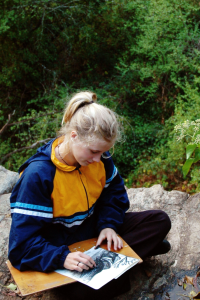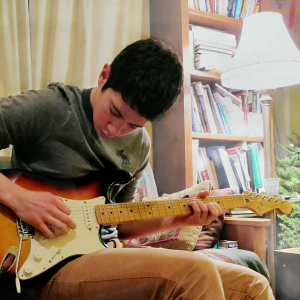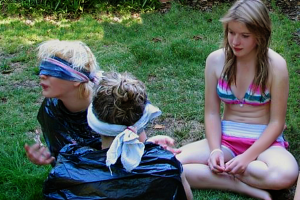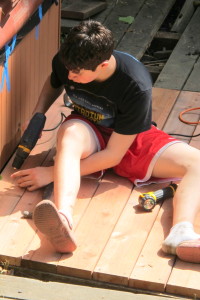Fifteen Years
 Background: The Gesell Institute of Child Development has observed that children and teenagers go through a repeating sequence of six different stages with predictable changes in mood and behaviour in each. Fifteen Years includes just one such stage. The behaviour observed in these stages reflects the qualities associated in tradition with the planets—in the case of Fifteen with Saturn.The developmental traits in these profiles represent only one aspect of behaviour and may be masked, modified or intensified by other factors, both individual and environmental, such as temperament, gender related behaviours, high stress levels, over-stimulation, too much screen time or organic problems.
Background: The Gesell Institute of Child Development has observed that children and teenagers go through a repeating sequence of six different stages with predictable changes in mood and behaviour in each. Fifteen Years includes just one such stage. The behaviour observed in these stages reflects the qualities associated in tradition with the planets—in the case of Fifteen with Saturn.The developmental traits in these profiles represent only one aspect of behaviour and may be masked, modified or intensified by other factors, both individual and environmental, such as temperament, gender related behaviours, high stress levels, over-stimulation, too much screen time or organic problems.
Note: If your young person has turned this age but shows none of these behaviours, please read the previous age level, or just wait a few months, then read this again!
These profiles integrate the wonderful descriptions from the Gesell Institute of Child Development research and the ideas of Rudolf Steiner into my own research. Direct quotations from Gesell are in ‘single quote marks’ or indented.
View/download pdf Fifteen
Fifteen
A stage with Saturn qualities.
The Gesell descriptions of Fifteen give a rare glimpse into the inner life of a Saturn type, revealing their inwardness (at home), more thoughtfulness, their sensitivity, their self-protectiveness and their determined independence. Less observable is the sensible, organised, business-like Saturn nature we saw at Nine. If we understand Saturn qualities we are well on the way to understanding Fifteens and what they need from us.

Fifteen years completes the fifth cycle of the six Gesell stages and more maturity to the turbulent times of this cycle in adolescence. The Gesell descriptions quoted in this profile come from the book Youth The Years from Ten to Sixteen, by Arnold Gesell, Frances Ilg, and Louise Bates Ames, published in 1956. Unlike the profiles on younger children, the profiles on Fifteen and Sixteen have not been updated by the Gesell Institute of Child Development. Yet this profile still illustrates the basic nature of Fifteen year olds today, though their environment is very different. New technologies of mobile/cell phones and increasing access to the internet and social media sites offer young people many new opportunities, but also create some disturbing problems associated with these.Growth in adolescence is complex.
There is now a huge amount of information available on all aspects of adolescent development, on the risks to teenagers today and advice on how to help them. This profile therefore concentrates on describing the nature of healthy Fifteens which the Gesell research identified and which reflect Saturn qualities. Living harmoniously with Fifteens depends very much on our understanding and respecting their feelings and their need for independence.
Physical growth
The archetypal Saturn qualities at Fifteen are modified by other factors in growth as well. At fifteen, a major influence is also the significant hormonal changes of adolescence. Hormones have a powerful effect on behaviour as women (and the men who live with them) can confirm, for they can observe the effects of the changing hormone levels within one menstrual cycle. For some boys, the levels of testosterone from Fourteen to Nineteen will be highest they will experience in their lives. It is important that they are helped to observe and understand the effects of hormones now so that they learn how to live more consciously and responsibly with their bodies and to care for their sexual health. Books on Natural Fertility Management help women to observe the changes in their bodies better and writers on men’s issues like Steve Biddulph often explain the effects of male hormones on behaviour.
Another strong factor influencing behaviour at Fifteen is that the emphasis in physical growth is being established again in the head and nerve sense system. This brings further maturing of, and sensitivity in, the nervous and sensory systems. Gesell researchers noted: ‘Fifteen appears to have a low threshold for all sorts of stimuli. He is especially sensitive to noises and may have to shut himself in his room to study.’ They speak with a soft voice now, compared to the loudness of Fourteen. These new sensitivities also express themselves in other ways which perhaps account for Gesell’s description of the stage as ‘neurotic’: irritabilities, resistances, aversions and suspicions manifest in the behaviour of Fifteens.
Gesell researchers suggested that this age group can take Vitamin B, the vitamin which particularly supports the nervous system, and can raise the sensitivity threshold so help Fifteens to become less nervous and less sensitive. This new, more subtle, ‘sensing’ of the world applies to both the physical world, and the world of human feelings, both in themselves and in others. Gesell observes these ‘new feeling awarenesses of fifteen (whether negative or positive) extend into intellectual, philosophical and aesthetic realms.’
The growth spurt in the brain, which began in early adolescence, is still continuing. Neuro- science is now able to demonstrate clearly that the pre frontal cortex, (that part of the brain behind the forehead which controls more complex decision making and other executive functions,) is still not fully capable of the kind of reasoning that allows adults to make rational decisions. Fifteens literally need more time to consider options and risks, to think before acting, to give the higher brain time to do its work. Gesell identified this need for more time in Fifteens in their original study, as we shall see later.
Gesell described how physically Fifteens generally enjoy good health; some Fifteens have nosebleeds; glandular fever (infectious mononeucleosis, caused by the Epstein Barr virus) has begun to appear. Acne may worsen at this time and some Fifteens have headaches, possibly related to constipation. ‘Blackouts’ under pressure of exams can occur, even ‘dreaming off into space’. ‘They have a lessened interest in food, including sweets’, perhaps with the exception of those in a big growth spurt. ‘Tensional outlets often involve exerting pressure— Fifteen digs at the scalp, scratches pimples, picks at cuticles, snaps fingers, twists ring, fools with a knife; the hands are eternally busy, fiddling and often as not driving the adults crazy.’
Fifteens may also have times of feeling terribly tired, ‘almost dead.’ ‘Their outgoing energies are so frugal that they sometimes are considered to be lazy, or at least tired.’ Gesell observed that Fifteen is generally a good sleeper but their dreams may also reflect this tiredness: some ‘dreams reveal a frozen state of inability to reach out, or to walk— a helpless feeling.’
Today, Fifteens, like the rest of the population, may be sleep deprived and not know it. New technologies and increases in screen time may also be affecting quality of sleep. As mentioned in the Fourteens profile, new research on sleep is showing that adolescents need as much sleep as younger children but few are getting it and make up for it with long sleep-ins on weekends. Their sleep-lack only worsens with increases in homework and increased socializing as they get older. Suggested sleep strategies are to get from 8.5 to 10 hours per night, with a regular sleep routine, as well as avoiding stimulation and long bouts of screen time before bed (screen time appears to lower melatonin levels which affect sleep.) Inadequate sleep can cause lower cognitive function, greater mood swings, depression, less self-care and other symptoms not immediately associated with sleep loss, like weight gain and being more prone to acne. Teenagers may need some help in understanding this. Mobile/cell phones have multiplied the opportunities for social communications that can also compromise sleep time (like texting through the night) and agreements may have to be put in place to protect healthy sleep habits!

Sense of self
One experienced high school teacher observed that Fifteen seem to be asking the question: “Who am I?” whereas previously Fourteens seem to express the statement: ‘I am!” Gesell describes one of Fifteens’ maturity traits as being ‘increasing perceptiveness’, a ‘heightened or deepened self awareness’, a far stronger self consciousness and individuation. Fifteens may be quieter, more serious and thoughtful; they show a ‘quiet, musing preoccupation’ with the finer shades and shapes of feeling. They enjoy ruminating and cogitating and attending to details of thought. This awareness ‘extends into intellectual, philosophical and aesthetic realism.’ Fifteens have pulled right in since being the gregarious, enthusiastic and wide ranging Fourteens.
But all this is not so straight forward, for Gesell describes the stage of Fifteen, (like that of the Four and a half year old and Nine year old,) as not only ‘inwardized’ but also in ‘disequilibrium, neurotic and troubled’. Teachers talk of “the 15 year old slump’ and Gesell commented that this seemed to be ‘a limited period of discouragement based on confused self-criticism’. It is true that Fifteens may appear to be moody and even indifferent, and, at times, even cynical and antagonistic, especially at home. Yet Gesell researchers, true to their deep empathy with children, say that Fifteens’ apparently negative traits are more complex than they might seem. Generally Gesell found Fifteens to be happier than they appeared (though less happy than they were at fourteen).
Fifteens tend to be at their best away from home in a new situation. However, at home they have more opportunities to withdraw into a space of their own. Gesell researchers say, ‘His recurrent tendency to mull springs from a desire to understand more precisely his own feelings or those of another person.’ ‘He may withdraw from a room, not to remove his presence, but to turn something over in his mind. In a dark mood he may shuffle off with his mind set; but more often his moods are lighter and briefer.’ Fifteens have ‘little moods’ which one Fifteen regarded as ‘a legitimate and agreeable experience.’
All this thoughtful pondering and self-examination comprises a self-education which helps them to develop more self-reliance and more willingness to take on responsibilities of their own accord.
Fifteens are complex and more sensitive, if still inexperienced. Descriptions of Fifteens are interwoven with Saturn qualities: their inwardness, self consciousness, secretiveness, independence, sensitivity, deeper thoughtfulness, need for freedoms and independence. The behaviour of an introverted type, like the Saturn and Fifteen, is often misunderstood. Perhaps we generally are not very understanding or tolerant of those who turn inward, because in doing so they turn away from us. Withdrawal may be felt as rejection; concentrated inward pondering may be seen as moroseness.
This characteristic drawing into themselves manifests in a more intense need for privacy at fifteen. This needs to be clearly understood and respected by the adults in their lives. Fifteens are careful of revealing too much about themselves to just anyone. Gesell researchers overheard one say on going into their interview: “Oh, I am not going to let them know too much.” They say: ‘It is when [our] interviewer seems to be prying too directly into Fifteens private affairs that he withdraws and detaches himself.’ If pressed to reveal what they do not wish to reveal Fifteens may be ‘monosyllabic and cold with a trace of hostility’, ‘withdrawn’ and answer with ‘vague, unrevealing replies’. ‘He doesn’t like to be restrained, to have questions asked about his whereabouts, his plans, his friends he is going to meet. He is expert at stalling in his answers to questions and ends up by telling you nothing or close to it. He does not wish his inner privacy to be invaded’.
When adults do not respect Fifteens’ need for privacy, when they continue to ask questions and probe, even with the best of intentions, it may be that Fifteen has to take defensive action and go into avoidance. Parents report ‘Fifteen is said to be “unapproachable when his wall is up.”’ Some Fifteens appear to become ‘contending isolationist[s] at home’. . They may ‘omit or skimp their greetings…keep to themselves…resist restraints and restrictions, however reasonable. Others engage their parents in a cold war of varying intensity. Still others vent their belligerence by dashing out the door and getting away from it all…the door slams on closing…’
While some withdraw from the household and become sullen, disagreeable and hard to live with, others become more secretively defensive. Others again, perhaps due to a combination of right temperament and understanding, manage to live peaceably—just.
All of this can be seen to be in defence of their privacy and their independence, especially within the family, but also at school. But the message is clear here. Fifteen does not want you to pry. This is a very strong quality of Saturn also. Fifteen and Saturn need inner freedom—freedom from other people’s interference, expectations and judgements. They do not feel as free if other people know every little detail about them. Holding back information from others is a way protecting this inner freedom, even if it irritates or even “hurts” others when they feel excluded. Then Fifteens are seen by others as secretive and unsocial. The Saturn type is not particularly well understood in this either. They both sometimes want to keep the world at bay. The outside world does not like that, is not comfortable with it, and can even resent it.
Need for independence
 Fifteens need for privacy and inner freedom is also expressed in their need for independence. Gesell says: ‘Independence and liberty are his constant cry. You would think he never had either.’ He ‘feels he is growing up’ and ‘craves to have some free, loose, unbudgeted time’. He ‘does a lot of travelling in his fancies’. This rising sense of independence is still ‘immature and expresses itself in crude forms, naive and otherwise.’ Fifteens have a growing sense of self dependence, yet they also realise they have dependence on others.
Fifteens need for privacy and inner freedom is also expressed in their need for independence. Gesell says: ‘Independence and liberty are his constant cry. You would think he never had either.’ He ‘feels he is growing up’ and ‘craves to have some free, loose, unbudgeted time’. He ‘does a lot of travelling in his fancies’. This rising sense of independence is still ‘immature and expresses itself in crude forms, naive and otherwise.’ Fifteens have a growing sense of self dependence, yet they also realise they have dependence on others.
It is also important to note that Fifteens want to be responsible but not to be forced into it. If Fifteens’ freedom and independence, like their privacy, is respected they do not have to defend it. The level of defensiveness in an individual Fifteen-year-old probably is directly related to whether or not the adults at home, school and work respect and work constructively to meet his or her needs, especially the need for freedom and independence, while calling out the best in them in asking for responsibility in return. It can be done, and some parents and teachers do it well. Teenagers do not have to rebel if there is nothing to rebel against because all their real needs are being met. Certainly we should aim to avoid pushing them into rebellion most of the time. They are most at risk when they are in rebellion all of the time. All this takes understanding.
Need for time
Fifteens have yet another need, which if not met can also lead to resistances—their need for more time, another characteristic of the Saturn type. This is perhaps consistent with the neurological limitations of pre-cortical brain function at this time. Gesell describes this in a number of different contexts: ‘Fifteen needs time.’ ‘He sometimes seems unable to move from his detached state.’ ‘As a rule, Fifteen warms up when given time.’ ‘His answers to questions [may] come slowly because he wants to phrase his reply just right. He may show his inner movement [of inwardly preparing his answer] by outward expressions.’ Fifteen is also a ‘stickler for precision’ almost a ‘perfectionist’.
‘A teacher respected by Fifteen gives him time to become receptive’ by using ‘methods of settling down’ with him. Then he is capable of good attention. He ‘may need to be helped over the hump of getting started’ and ‘protected from interruptions.‘ He does not like ‘idleness’. He‘likes to have things come closely together, to fill in spare time’. ‘That’s why Fifteen likes to do things slowly to the last minute, even though he might then be rushed.’
So we see Fifteens need time for neurological functioning, to shift task, to settle down, to prepare, to meet their standards for precision and correctness and to deal with distracting interruptions. Do not assume that Fifteens are not doing anything just because it is not yet visible to you; they may be working very hard inwardly but it has not yet manifested outwardly. Give them time. This may be a time when asking them to do tasks spontaneously, ‘just off the top of their heads’ is unfair. Like Nine year olds, they may ‘first have to think about it.’ Ideally, they may also like the option of a few nights to sleep on a school assignment, when that is possible.
We also see this need for time in ethical decisions for Fifteen. Gesell notes: ‘He wants to think through his own decisions and if he has chosen a wrong one he recognises that he did not think. Fifteen is more aware of conventions, of standards, of principles, of rules and of religious codes. These help him to make his decisions.’ Fifteens’ ethical sense is more defined than ever. They are ‘sensitive to [their] own limitations and prone to become confused about [their] potentials and responsibilities.’
This need for time for precision can also be seen in a refinement in speech and meaning, and respect for the spoken word, as Fifteens make a noticeable effort to ‘find just the right words or phrases to express their thoughts and ideas correctly, to give exactly the true impression of what they meant to say.’
Emotional development
 It is clear that Fifteen is a time of more inwardness, sensitivity, self-containedness.’ In some ways his will and self-control can be seen most in his feeling life, for Fifteen is a ‘time of controlled emotions.’ Fifteen ‘doesn’t get mad as often as he used to and is not so quick to fly off the handle. He is more apt to withdraw, walk away, or to ignore the source of his anger. Sometimes he just stays where he is and thinks things to himself without saying a word until his mad feelings have left him.’ Some Fifteens, however are more apt to retaliate, especially against their mother, with a caustic or sarcastic remark.’
It is clear that Fifteen is a time of more inwardness, sensitivity, self-containedness.’ In some ways his will and self-control can be seen most in his feeling life, for Fifteen is a ‘time of controlled emotions.’ Fifteen ‘doesn’t get mad as often as he used to and is not so quick to fly off the handle. He is more apt to withdraw, walk away, or to ignore the source of his anger. Sometimes he just stays where he is and thinks things to himself without saying a word until his mad feelings have left him.’ Some Fifteens, however are more apt to retaliate, especially against their mother, with a caustic or sarcastic remark.’
With their deeper sensitivity, it is not surprising that they are more easily moved to tears. Since Fifteen is more apt to cry in private, others may not know of this expression of his emotional state. He (or more likely she) is most apt to cry when he is unhappy and generally discouraged and may find that crying is a “sort of an outlet” or “a means to relax.” Fifteen is also ‘moved to tears about what happens to other people as depicted in stories and movies.’ The following year, Sixteen will not find the use of tears so therapeutic.
Although ‘Fifteen may be secretive and withdrawn, he is not always interested in covering up his feelings. He reports that he usually tries to conceal them but there are times when he even wants people to know how he feels.’ At any rate for those who are observant, he shows much of what he feels in his body language.
At this age, security is important’ to him, and this too is a Saturn quality. However, they do not have ‘a lot of fears’.
Relationships and home
Fifteens once more face the conflict between the needs of the individual and the needs of the group but with more maturity. They have a growing awareness of the interdependent nature of the human community of individuals. They feel strongly ‘a rising spirit of independence’ individually, yet they also characteristically feel a deep loyalty to those they care about (another Saturn quality). Fifteens are keenly aware of group pressures and the adjustments they need to make in managing the different groups in their lives, of home, school and community but they also feel the challenge to pit their ‘independent mindedness against group pressures.’
While Fifteens take their attempts at independence seriously, and want to outgrow dependence on parental control, they are not trying to disown their families. Although much of the time Fifteens are fairly happy and get on reasonably well with their parents, they sometimes show all the signs of waging a cold war with them, especially when they feel their parents do not understand and respect their new needs. ”They have the wrong idea.” At such times, Fifteen may welcome group discussions ‘but may tend to close his mind to any influence his parents may wish to bring to bear.’ ‘Family unity seems to be at an all time low!’ Sadly with some, their rejection of family company may be a way of protecting their status within their peer group. Adults need to recognise that Fifteens want independence of family in regard to their peers. Luckily, their relationships with siblings at this time have greatly improved. ‘
On the other hand, Fifteens show an increasing ability to identify with persons and situations. They can suddenly burst out with a quip, for their humour is dry and favours wit and they ‘may use dramatic mimicry to project and vivify [their] impressions of teachers and other personalities with whom [they] are acquainted.’ They ‘can make penetrating remarks indicating [their] impressions’. Of course they also note more analytically and seriously the traits of their parents. When parents can give their Fifteens enough space, they may get to share in Fifteen’s wit too.

Friendships and school
Fifteens are gregarious out of home with their peers and value their friends. They have deepening friendships with individual peers. They tend to move in groups, and date individually less (does this leave them more freedom in not being tied down to one person in casual situations?) They may sometimes prefer smaller groups which offer more opportunities for discussion, which they love. In their group too, they realise that, while they have greater self awareness and self dependence, they do still depend on others.
There is another characteristic of this year, which the teachers described as “the 15 year old slump.” Fifteens, Gesell assures us, are not ‘anti-school’ any more than they are really ‘anti-home’ but they do show a restlessness and boredom with the familiar, driven also by a yearning for more freedom. In the past , this restlessness may have driven some young people to ‘drop out’ of school but now, with compulsory schooling, it manifests in new ways—maybe they want to change schools, or go on a student exchange to another country instead— but still there is this subtle resistance against an adult world that wants to restrict their freedom. It is unsettling for many Fifteens to have other peers restless like this. What keeps Fifteens where they are is often their friendships. In general Fifteen enjoys the group life of school but much of how Fifteens deals with the rest of the school experience depends on the school and individual teachers.
So Fifteens are complex, with more inwardness, thoughtfulness and deeper feeling and sometimes hidden, sensitivity, with many qualities of Saturn. It is best not to judge them by outer appearances or to be affronted by their behaviour. One needs to look behind it to see how they are protecting themselves and trying to manage the complex web of loyalties and perhaps new feelings they face. They need to be met with sensitivity, and taken seriously, with an appreciation for their humour.
Drug use and parent support
Advice given in the earlier profiles (Fourteen) about drug, sex and risk factors is still relevant here; young people still need information and reminders about how to keep themselves and others safe and healthy. As we saw at earlier ages, teaching them to have a deep respect for themselves and their bodies is a key strategy in teaching them to take responsibility for themselves around drug use and in sexual activity.
Statistics on drugs and alcohol differ from survey to survey and from country to country but would suggest about 10 to 15 % of Fifteens are at possibly serious risk from drug use, with many more regularly consuming alcohol but not to the point of being drunk. This still leaves a lot of Fifteens who are not showing high risk behaviours. It is reasonable then to trust most Fifteens to do what is sensible, with your support. You need to make sure they have the information they need to stay safe and healthy, and accept that they may make mistakes. It is far more helpful and respectful for parents to be able to talk about risky behaviours with Fifteens while still trusting them to be sensible. Trust helps to build trustworthiness, on your side and theirs. However, if your particular Fifteens are in the “at serious risk 10 to 15%”, from what you know or can guess looking at the risk factors they need your help. Whether they listen to you now will depend on how you do it and how you have been doing it over the past few years. Get the help of an experienced counsellor.
Deep parent commitment makes a big difference in supporting teenagers even as they grow into independence from us. A woman giving a talk on teenagers and drugs was asked by a mother how she could support her teenage son to kick his cannabis use habit. The advice given was surprising but insightful. It was for the mother to identify one of her own addictive behaviours and get an agreement with her son that they would each change their behaviour and support each other in the process. This is no time for ‘armchair’ or ‘remote control’ adult support, for fifteen will have no respect for that; what this speaker was suggesting was that by modelling what her son needed to do in her own efforts, using her own will, on something that was difficult for her to do, she would strengthen her son to also attempt to overcome his own dependency, out of his own independent decision. (If any adults have trouble identifying their own addictive behaviours, their teenagers will probably be able to suggest a few, maybe even one where its elimination might help them as well—like what they feel is compulsive over-concern for them!)
For more on this see Drugs and your teenager
Sexual activity, pornography and continuing sex education
As with drug use, young people still need information and reminders about how to keep themselves and others safe and healthy. Statistics on first sexual intercourse differ, but the Guttmacher Institute (U.S.A.) suggests about 13 % of girls 18% of boys at Fifteen have had first sexual intercourse. The Kinsey Institute figures (U.S.A. again) put it higher than this. As has been said before, sex education should have been made available before thirteen, but information on sexual health, our sexual needs, men and women, contraception and sexually transmitted diseases needs to be reviewed as life unfolds. Sharing information about sexuality is ideally an open, ongoing conversation into adulthood. Making available information on natural fertility management is highly recommended for a better understanding of female sexual cycles. (See Further Reading list). It is also important to be aware of the side effects of hormonal contraception, including the oral contraceptive pill, which include mood disorders, depression and interference with later fertility, if introduced before ovulation cycles are properly established.
Pornography also needs to be discussed as part of this ongoing conversation about sexuality. Today porn can be easily accessed by anyone and has become a major source of information about sexuality for young people. One figure given is that 80% of US teenagers aged 15 to 17 have watched hard core porn, often unintentionally. Young people need information and the ability to think critically about porn. More referenced information on teens and porn, sexual health and healthy guidelines for sex can be found on www.healthysex.com (2014) an information site for adults (16 years plus). This could be used as a basis for discussion. Pornography is devoid of respect and care; it objectifies people, particularly women and children; it is also aggressive, particularly against women, both physically and verbally, and is shaping young people’s expectations about what sexual experiences involve, but not as gender-equal respectful experiences. It gives the wrong messages about sexual health, use of condoms, and normalises some potentially dangerous sexual activities. There has been a lot of discussion about porn being addictive and UK research has now shown that when those who consider themselves addicted watch porn it does indeed create brain patterns seen in other addictions. Our young people need to know what they see in porn is often not normal or healthy and they need our help to put porn in context.
Respectful care of each other other in sexual relationships is, of course, central to healthy sex, and discussion of what may be abusive, physically and emotionally, is helpful here. The Maltz Hierarchy Model of Sexual Interaction (available on www.healthysex.com under ‘Self Help Articles’ 2014) is useful for clarifying the issues for parents and giving a basis for talking about keeping sex healthy. It speaks of conditions such as consent, equality, respect, trust and safety leading to healthy sexual interactions, while conditions of dishonesty, disregard for physical safety, domination, objectification and shame leading to negative sexual interactions. Maltz helps us to see where one can slide almost imperceptibly into the other.
There are also increasing problems arising from pornography influencing pop culture and through this affecting teenagers particularly girls, whether they watch porn or not. Distorted and manipulated body images can make what is normal and healthy seem abnormal and unacceptable. The result can be that some teenagers may feel inadequate in their body image, and some teenage boys, when they meet the reality of girls’ bodies, may be disappointed, even repulsed. This is creating serious new problems, many of which continue into adulthood. Our teenagers need information and reassurance, encouragement of self-acceptance and belief in themselves. Here is another way parents can model the celebration of difference in each individual, by encouraging acceptance of who we are physically in all our shapes and sizes. This provides a buffer against the pressures on teenagers to try to change who they are and how they look in order to become what the current fashion demands, in the case of girls, those oddly irreconcilable ideals of anorexic models and big breasted porn stars.
Respect for their own heath and well being is also important in Fifteen taking personal responsibility for their use of new technology and mobile phones. Some areas of concern in relation to these are covered in the Fourteen profile in more detail.
Or see Sex and your teenager or Technology and your teenager
Recognition of a new stage
The year of Fifteen comes as the completion of five full Gesell cycles, experiencing six very different ways of being in the world, with different priorities for living: love, power or freedom. This stage with Saturn qualities came at birth, at standing, at the special time of nine and now at fifteen. If one extrapolates onwards in equal yearly increments it also brings us to 21, later to 33 and after many repetitions to 99, the year we would turn 100.
 Fifteen itself is an interesting year. It has many challenges; physically for many it is an ungainly time: skin problems embarrass some; facial features seem out of proportion for others; intellectually, they need more time; socially, because of their intense need for independence, they may be pushed into sullen withdrawal and rebelliousness. It is a time when they feel their individuality strongly and want independence, perhaps before they seem capable of it to others. In a way it represents ‘youth’, at the edge or beginning of adulthood. It is still most commonly the age when compulsory schooling ends and full time employment is permitted, which in itself is a recognition of the place Fifteen holds in the youth-to-adult spectrum. It is the time for apprenticeships in the workplace and for an apprenticeship for adult living, when skills need to be taught, opportunities need to be provided, responsibility given in areas where skill is not fully developed yet. It makes the master craftsman and the parent nervous but they must stand back a little and let the apprentice do his work.
Fifteen itself is an interesting year. It has many challenges; physically for many it is an ungainly time: skin problems embarrass some; facial features seem out of proportion for others; intellectually, they need more time; socially, because of their intense need for independence, they may be pushed into sullen withdrawal and rebelliousness. It is a time when they feel their individuality strongly and want independence, perhaps before they seem capable of it to others. In a way it represents ‘youth’, at the edge or beginning of adulthood. It is still most commonly the age when compulsory schooling ends and full time employment is permitted, which in itself is a recognition of the place Fifteen holds in the youth-to-adult spectrum. It is the time for apprenticeships in the workplace and for an apprenticeship for adult living, when skills need to be taught, opportunities need to be provided, responsibility given in areas where skill is not fully developed yet. It makes the master craftsman and the parent nervous but they must stand back a little and let the apprentice do his work.
The reality is that the adult’s sphere of authority is much more limited now. Fifteens are out in the world a lot of the time, independent of adult ‘supervision’. What has been prepared over the previous fifteen years, comes to the test. The grounds for good self esteem, resilience, responsible responses, respect for others and themselves, independent thinking and so on have been prepared—or not. We are in the time now for trust that the work has been done and will carry us through, with a little deep breathing and inner calm required in places by the adults in Fifteens’ lives. Fifteens want and need, and will take, independence, either externally or internally, whether we like it or not. So we need to facilitate that. Encourage them to think things through, to plan, to be responsible to themselves and to others. It is not about control, but about mentoring. The adult role now is to be a worthy mentor, even when Fifteens do not seem to be watching, or wanting one.
This is not about giving away all expectations of responsible behaviour from Fifteens but changing the framework in which it is seen. As adults, hopefully, we show respect and concern for the other adults we live and work with. We tell them where we are likely to be, whether we will be around to eat dinner with them and so on. If there is a change of plans, many have mobile/cell phones to let our family know now, most times (barring running out of credit, being out of range in the countryside or dropping your phone in water—all of which seem to frequently happen!) Sometimes, we just have to have an agreement ‘not to worry’, to trust our dear ones not to put themselves in harms’ way by thoughtlessness, and trust fate that, somehow, we will deal with whatever comes. There is a task a teen might be happy for you to work on: to only worry about the things you have the power to change.
All this will be the more worthwhile when at Sixteen, you can all see the gifts of this cycle of growth, coming to fruition, if sometimes awkwardly but determinedly, at Fifteen.
View/download pdf Fifteen
Further reading
The Gesell Institute of Child Development quotes are from:
Gesell, Arnold, Ilg, Frances L & Bates Ames, Louise Youth The Years from Ten to Sixteen (Hamish Hamilton, London 1956) ‘Fifteen’ p214-250
Weschler, Toni Cycle Savvy: The Smart Teen’s Guide to the Mysteries of Her Body (HarperCollins, New York, 2006)
For natural contraception methods see: www.nfmcontraception.com
For a better understanding of healthy sexual boundaries see the Maltz Hierarchy Model of Sexual Interaction at: www.healthysex.com
See also
Avoiding trouble with elevens, twelves and teens
Building self esteem and resilience
Sex and your teenager
Technology and your teenager
Drugs and your teenager
Strategies for healthy living in the family